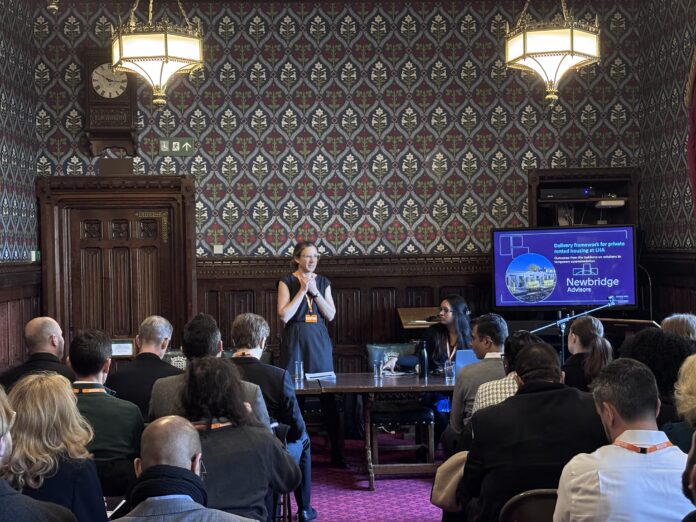By Janani Paramsothy, Associate Director – Social Housing
The UK’s proposed new sustainability disclosure regime
As a provider of sustainability consultancy services for social landlords, Newbridge responded to a series of consultations ran by the UK Government recently around strengthening and codifying the sustainability disclosure regime in the UK.
The package included:
- The long-awaited position on the UK SRS, setting out how the government intended to adopt the international standards on sustainability disclosure (IFRS S1 and S2)
- Regulation of assurance providers in the sustainability space, linked to incoming disclosure rules
- Rules around climate transition plans, including who would be captured, scope and content.
Why is this package important?
The proposals set out across the three consultations aim to make sustainability disclosures more transparent, uniform and therefore beneficial to investors and others who would rely on their content. This is a fundamental move to ensure the smooth functioning of the sustainable finance market in the UK, something the government is keen to capitalise on.
The rules should prevent greenwashing, providing clear assured data on the performance, risks and opportunities of companies and organisations.
What are the Government proposing
UK SRS
IFRS S1 and S2 are the internal standards on sustainability disclosures, set by the ISSB in June 2023. S1 sets out general requirements for disclosure of sustainability-related financial information and S2 sets out climate-related disclosures.
Among the key requirements, companies that are captured must:
- Disclose information about sustainability risks and opportunities relevant to investors and lenders
- Cover governance, strategy, risk management and metrics, aligned with the Taskforce for Climate related Financial Disclosures (TCFD) framework
- Connect information with financial statements and prepare using same reporting entity and period
- Focus on materiality
- Disclose physical and transition risks, opportunities, all three scopes of GHG emissions
The Government proposes to adopt this in full with some small amendments:
- Adapting transition relief to ensure principle of connectivity between financial statements and sustainability disclosure remains, while granting some additional time to calculate and publish scope 3 emissions.
- Removing elements which do not apply in the UK such as the Global Industry Classification Standard and the applicability of SASB (a US non-profit) materials on development
- Carbon credit use towards emissions should also be in disclosure as part of IFRS S2
Regulation of assurance
The government set out the conclusions of FRC’s Assurance of Sustainability Reporting market study, which found significant stakeholder appetite for greater regulatory oversight of the assurance market. At present there is a wide variety and choice of assurance providers, but concerns over consistency in quality of the assurance provided. There were concerns about immaturity of UK sustainability assurance market and a potential monopoly by the “Big Four” consultancy firms.
In response, Government has developed a proposed regulatory regime:
- Create a new category of “sustainability assurance provider” qualified to provide third-party assurance over an entity’s sustainability-related financial disclosures. This will be profession-agnostic.
- Overseen by ARGA (a new body) who will be responsible for registration, setting eligibility criteria, monitoring performance and taking proportionate enforcement action when they perform poorly.
- At this stage, Government anticipates the regime will operate on voluntary basis with market participants opting in rather than government making it a precondition to offering assurance services.
- ARGA will consult on detailed elements of the regime once established.
- Government is also considering mandatory assurance of company disclosures against UK SRS .
Climate transition planning
This set out potential routes to developing and implementing credible transition plans that align with the 1.5C goal of the Paris Agreement for UK regulated financial institutions and FTSE 100 companies. It does not affect UK housing associations at this point, though rules and guidance here will invariably form a pathway for those developing plans voluntarily. There is also an interaction with IFRS S2 which sets out an entity’s targets, actions or resources for its transition towards a lower-carbon economy. The consultation acknowledged that despite many positive signs and emergence of industry best practice, there remains a gulf between the number of companies with a public climate or environmental targets, and those with robust, transparent and actionable transition plans to achieve those targets.
The consultation goes on to set out benefits and use cases, and asks questions around costs, challenges and alignment with other relevant jurisdictions. It also asks questions around implementation options, for example on the role of the Transition Plan Taskforce framework and interaction with the UK SRS.
Newbridge response
UK SRS
We overall agreed with the approach as set out in the consultation and are in support of the UK’s adoption of IFRS S1 and S2. Rather than using multiple frameworks for reporting on climate or sustainability-related matters, entities will be able to use one comprehensive set of standards that has been developed to meet investor needs. It will also allow financial planning to be aligned with sustainability planning by driving joint reporting.
Some changes are necessary to ensure practical application in the UK and avoid the creation of a two-tier system between financial statements and sustainability information. We agree with the Government’s pragmatic approach to this.
As others in the sector have done, we also raised the sector’s Sustainability Reporting Standard for social housing (SRS) and the separate timetable for housing association ESG reports, but agreed these should be brought together. We further agreed with the additional time to develop and publish Scope 3 emissions, as this is generally less developed in the sector currently.
We urged Government to be clear on timelines and for guidance on those reporting voluntarily. While flexibility is important, so is clarity and consistency.
We agreed with removal of mandatory consideration of SASB and strongly agreed that carbon credit use towards emissions should be part of disclosure.
Assurance provision
As a focused assurance provider to the sector working with a range of clients, we felt Newbridge had valuable insight to offer in this space. We largely agreed with the Government’s aims and proposals to achieve them. We also believe that assurance should provide value-for-money and quality products for clients. We agreed the new ISSA 5000 would be a good standard to aim for, once it comes in.
There is no reason that this work should be gate-kept within any particular profession and opening it up ensures a greater volume of people are able to undertake it, as well as bringing in a greater range of skills. We are specialist in what we offer but would not classify our work as an, and as a result have been able to provide limited assurance services at significantly reduced rates in comparison to the ‘Big Four’ as a result. We are however regulated by the FCA and have established procedures and divisions in workforce to demonstrate independence from consultancy.
We offered some suggestions on efficiency to reduce duplication between this proposed regime and others such as the FCA.
We put forward the following principles for ARGA to consider in building the new system:
- Easy to access and operate, ideally online
- Proportionate to the details which are required (names of key staff, key training, details relating to the firm)
- Proportionate to size of the firm in registration fee to prevent only the bigger players from being to operate
- Collaboration – enforcement should focus on working collaboratively with providers in the first place and not focus on punitive measures, especially as regime is new and bedding in.
We did not respond to the climate transition planning consultation at this time as it was clear housing associations were not intended to be within scope of the proposals currently. The analysis is however interesting, and we will continue to monitor developments here as they progress.
If you are interested in discussing any of the proposals further, or want to find out what it means for housing associations, please contact us at sustainability@newbridge.co.uk.



